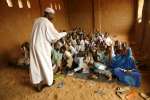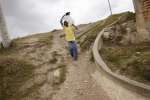- Text size
 |
|  |
|  |
| 
- Français
German scholarship helps refugees become class acts
Making a Difference, 23 August 2012
NEW DELHI, India, August 23 (UNHCR) – Young, bright-eyed and eager to take on the world: meet Jasmeet Kaur, an Afghan refugee and scholar who is studying to become an accountant.
Back home, the 18-year-old may not have had the same opportunities in a traditional society that exerts enormous pressure on girls to marry young. But she is lucky: "My parents are not educated. It is good that they are supporting me in every way, so that I will be educated," she says.
Jasmeet has spent most of her life in India, where she studied in a government school and has always been an enthusiastic student. Thanks to her hard work, she became one of 39 young refugees in India to be awarded a scholarship under the Albert Einstein German Academic Refugee Initiative (DAFI) this year. Some 350 refugees have been DAFI scholars in India since the program began in 2001.
"I learn once and don't forget," she says, smiling. Her secret? "I make notes and read and then I remember."
Like Jasmeet, many refugees excel in school and are then at loose ends, trying to fund their way through college. The German-funded DAFI scholarships are a lifeline to young refugees eager to further their education. During the current academic year, 20 more DAFI scholarships have been offered. The scholars get a monthly allowance, including for books and tuition fees. This has enabled some of them to get degrees and make something of their lives.
For 21-year-old Lali Nun Pui, the "marketing" training started early. "When I was young, I used to help my parents in their store, selling home-made food in my village," she says. Today, she's a confident young woman in her first year of a Bachelor's degree in Business Administration. With her parents still in Myanmar, she lives alone in Delhi, travelling by the Delhi metro to get to college every day.
"With DAFI, I can study English, I can buy the books I need for college. I am getting so much help and it's making me a stronger person," she says.
The DAFI scholar program is monitored by BOSCO, an implementing partner of UNHCR. Encouraged by UNHCR to do more for their communities, many DAFI scholars are involved in the activities of youth clubs run by this NGO. They help with education campaigns, persuading reluctant parents to send their children to government schools. Some help with tuition classes for refugee children at outreach centres, and all tutor one high school student each. Others help the elderly by visiting and by doing their grocery shopping.
Harveen Singh, 19, is the youngest of five siblings and is in his final year of an honours degree in Commerce at Delhi University. He sees his future in India and, like the rest of his family, has applied for Indian citizenship. "I am like an Indian," he says, looking ahead to a successful career in finance.
The DAFI scholarship is a stepping stone, turning dreams into reality. "I want to work in a big firm and take it even higher. I will prove that I can make a difference," says Jasmeet confidently.
Lali, too, has big plans: "I want to own a large showroom selling ready-made western clothes." Her degree will equip her with the skills necessary to take the first steps towards realising her potential. None of this – not even the dream – would have been possible without her DAFI scholarship.
Nayana Bose in New Delhi, India











































